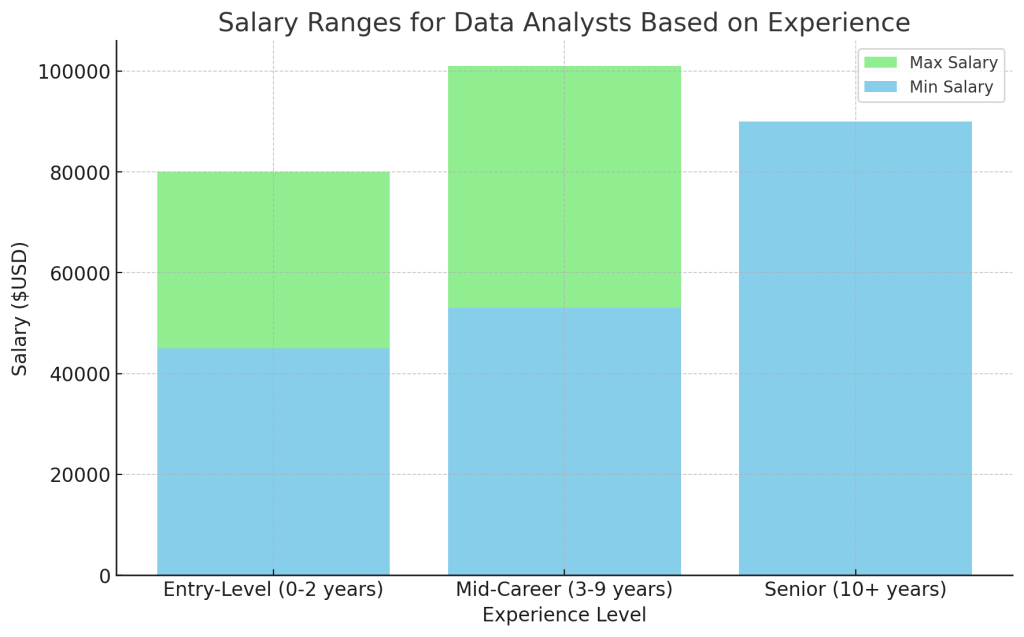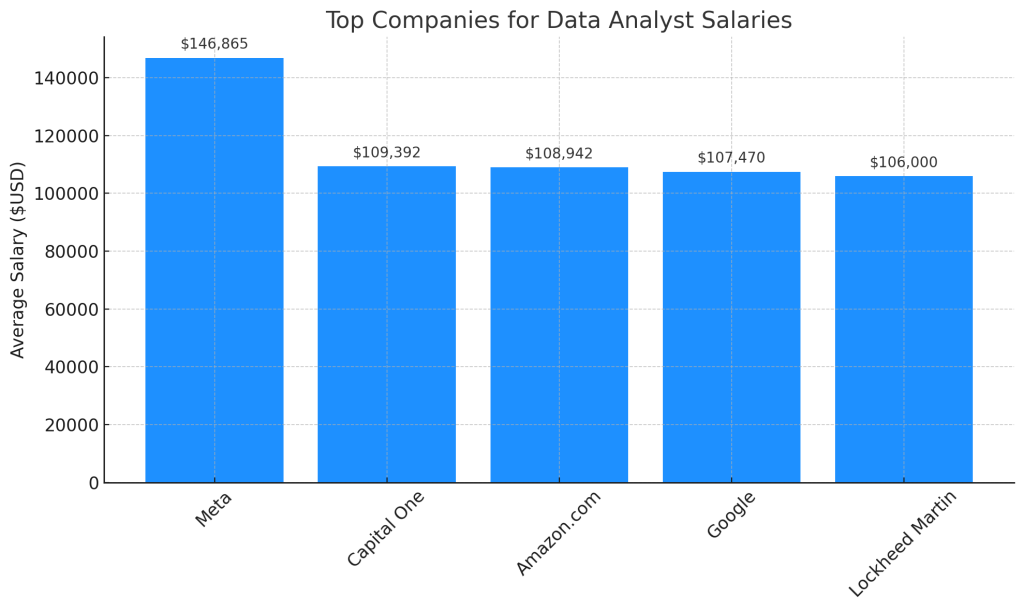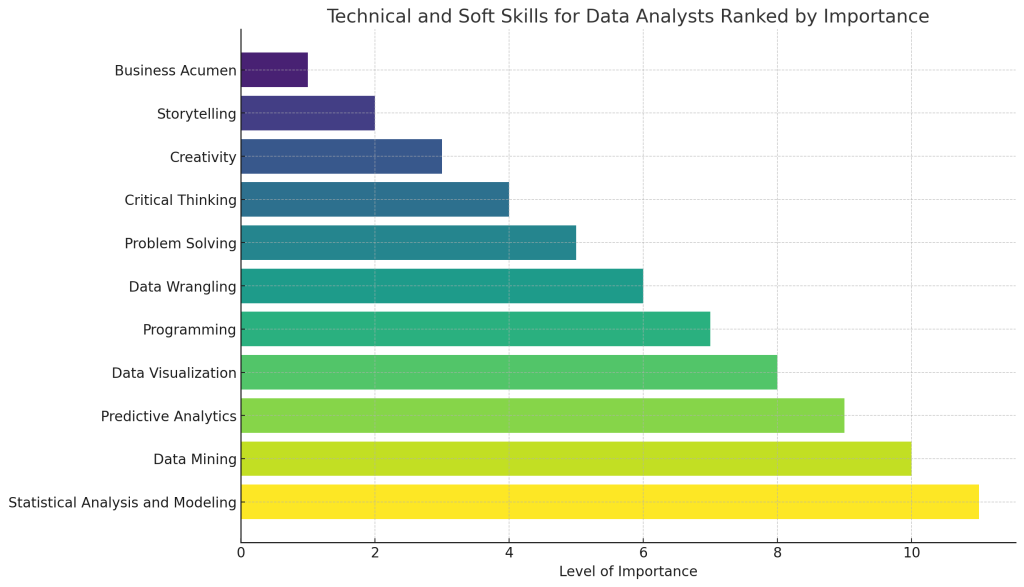
What is Data Analytics? A Complete Overview for a Budding Data Analysis Career
Data analytics is the area of computer science that focuses on extracting insights from raw data. Data analysts use statistical techniques and programming languages to uncover patterns, trends, and relationships within large datasets. The primary goal is to support data-driven data analysis decision making across organizations.
Data analysts collect, clean, and organize data from various sources. They build machine learning models, run statistical tests, interpret results, and communicate findings to stakeholders through dashboards, reports, and data visualizations. Their responsibilities span descriptive, predictive, prescriptive, and diagnostic analytics projects.
A career in data analytics offers an exciting blend of working with cutting-edge technology, solving complex problems, and seeing the real-world impacts of data-based recommendations. Those in this field can find opportunities in diverse settings, from tech startups to established enterprises, in industries ranging from finance and healthcare to retail and entertainment. As the world becomes increasingly data-centric, the role of data analysts becomes ever more crucial.
Data Analyst Overview
| Topic | Aspect | Description |
|---|---|---|
| Data Analytics | Definition | Area of computer science focusing on extracting insights from raw data. |
| Data Analysts | Responsibilities | Collect, clean, organize data; build machine learning models; run statistical tests; interpret results; communicate findings through dashboards, reports, visualizations. |
| Career Opportunities | Scope | Opportunities in tech startups, enterprises, finance, healthcare, retail, entertainment. |
| Skill Utilization | Application | Used in roles like data scientist, business intelligence analyst, market analyst, operations research analyst for strategic decision-making. |
| Daily Activities | Typical Tasks | Data collection and storage, exploratory analysis, advanced analytics, reporting and monitoring. |
| Salary Range | Compensation | Competitive salaries vary by experience, location, industry; median US salary is $66,500. |
| Future Outlook | Job Growth | Projected 35% job growth between 2022 and 2032; increasing demand for data-driven decision-making. |
What Type of Careers Use Data Analytics?
Various careers use data analytics, including roles like data scientist, market analyst, business intelligence analyst, and operations research analyst, where interpreting and transforming data into insightful information is crucial for strategic decision-making. And the data analyst career outlook? The future looks bright, indeed:
What Type of Data Analytics Do Some Careers Require?
A wide range of careers leverage data analytics skills to drive business value. Common roles include:
- Data Analyst – Collect, process, and perform analysis on data to drive insights
- Business Intelligence Analyst – Create reports, visualizations, and dashboards to communicate key business analytics findings to drive better business decisions
- Marketing Analyst – Optimize campaigns and product performance using analytics
- Data Engineer – Build and maintain data pipelines and infrastructure
- Data Architect – Design scalable systems and data storage frameworks
- Data Science Manager – Lead a team of data scientists and analysts
- Machine Learning Engineer – Develop models and algorithms to automate analytical tasks
What Kind of Industries Hire Data Analytics Professionals?
Data analytics is a versatile skillset applicable across diverse sectors. Many industries are ramping up their adoption of data-driven decision making and seeking talented analysts, including:
- Information Technology – Virtually every tech company leverages analytics, from social networks to gaming/entertainment platforms.
- E-commerce and Retail – Online retailers analyze buyer data to optimize recommendations and personalize experiences. Brick-and-mortar retailers also apply analytics.
- Finance and Banking – Banks use analytics for fraud detection, risk assessment, portfolio optimization, and beyond.
- Insurance – Insurance providers analyze risk factors and model coverage costs using actuarial analytics.
- Healthcare – Analytics assists with clinical decision support, patient profiling, hospital operations, public health policy, and more.
- Government – Analytics informs public policy across areas like transportation, defense, education, healthcare access, and urban planning.
Unlock Your Future in Computer Science
Explore Jessup University’s Innovative Program Today!
How Much do Data Analytics Jobs Pay?
Data analytics jobs typically pay very competitive salaries, with compensation varying based on factors like geographical location, industry, level of expertise, and the complexity of the role, ranging from entry-level positions to high-paying roles for experienced analysts.
Median Salary
According to PayScale.com, the median annual salary for data analysts in the US is $66,500. This means that half of all data analysts earned more than this amount, while the other half earned less.
Salary Variations
Various factors significantly influence data analyst salaries, including:
- Experience: As you gain experience and expertise, your earning potential increases. Entry-level analysts can expect lower salaries compared to seasoned professionals with several years of experience.
- Location: Tech hubs and major metropolitan areas generally offer higher salaries due to the increased demand and cost of living. For example, data analysts in San Francisco, California, earn an average of $128,670 annually, significantly higher than the national average.
- Industry: Specific industries, like technology, finance, and healthcare, typically pay higher salaries than others. Data analysts working in these fields can expect to earn more than their counterparts in less competitive industries.
- Job Role and Specialization: Specialized roles within data analytics, such as data architects and business intelligence analysts, often command higher salaries due to their advanced skills and expertise.
- Employer: Large companies with robust budgets often pay more than smaller organizations.
Salary Ranges
Here are some general salary ranges for data analysts based on experience:

Top Companies for Data Analyst Salaries
Some of the top companies offering competitive salaries for data analysts include:

- Meta: $146,865
- Capital One: $109,392
- Amazon.com: $108,942
- Google: $107,470
- Lockheed Martin: $106,000
Future Outlook
The Bureau of Labor Statistics projects 35% job growth for data analysts between 2022 and 2032, much faster than the average for all occupations. This rapid growth is driven by the increasing demand for data-driven decision-making across industries
Data analytics offers a promising career path with excellent earning potential. With the right skills, experience, and specialization, data analysts can command competitive salaries and enjoy a rewarding career in a growing field
Beyond competitive base pay, many data analytics positions also include performance bonuses, stock options, and comprehensive benefits packages.
As organizations continue investing in data-driven capabilities, they compete for analytical talent. This creates significant leverage for skilled data analysts and data scientists to negotiate higher compensation.
What Skills Are Required for a Career in Data Analytics?
What skills are required as a data analyst? A career in data analytics requires a combination of technical skills such as proficiency in statistical software, programming languages (Python, R), database management, and data visualization tools, as well as soft skills like analytical thinking, effective communication, and problem-solving abilities.
What Technical Abilities Are Most Important?
To extract value from data, analysts need expertise across several crucial skill areas:
- Statistical Analysis and Modeling – Build models to uncover trends and patterns. Key techniques include regression analysis, forecasting, simulation, and experimental design.
- Data Mining – Scout large datasets to identify relationships for hypothesis testing. Requires SQL and statistical software proficiency.
- Predictive Analytics – Make data-based predictions using machine learning algorithms like regression, clustering, classification, and neural networks.
- Data Visualization – Present findings through compelling interactive charts, graphs, and dashboards using tools like Tableau.
- Programming – Fluency in languages like Python and R to process, analyze, and visualize complex data.
- Data Wrangling – The ability to collect, clean, transform, and restructure raw datasets using SQL, Python, Spark, Hadoop, and related platforms.

What Soft Skills Help Data Analysts Succeed?
Alongside technical competence, certain soft skills enable effective collaboration, communication, and project outcomes:
- Problem Solving – Identify issues, create solutions, and determine optimal approaches backed by data.
- Critical Thinking – Objectively assess assumptions, interpret fuzzy data, and synthesize conclusions.
- Creativity – Connect disparate ideas and design innovative analytical frameworks.
- Storytelling – Compellingly communicate data-based narratives to both technical and non-technical stakeholders.
- Business Acumen – Grasp organizational objectives and decision contexts to provide targeted, actionable insights.
What Do Data Analysts Do on a Daily Basis?
The sometimes stressful day-to-day activities in a data analytics career typically require gathering and cleaning data, conducting statistical analysis, creating data visualizations, preparing reports, presenting findings to stakeholders, and collaborating with teams to implement data-driven strategies.
What Are Their Responsibilities?
What does a data analyst do? Data analysts tackle diverse responsibilities on a typical workday. Their tasks span:
Data Collection and Storage
- Identify valuable data sources – CRM systems, web traffic, financial records, sensor data
- Build data pipelines for streaming/batch data ingestion
- Develop schemas and maintain databases/data warehouses
- Clean, transform, and enrich raw datasets
Exploratory Analysis
- Manipulate and mine data to discover patterns and anomalies
- Visualize relationships between variables through charts
- Perform statistical testing to check assumptions
- Document processes and findings
Advanced Analytics
- Train machine learning models to automate tasks and generate predictions
- Continually monitor and tune model performance
- Employ techniques like regression analysis, simulation, optimization, and risk modeling
Reporting and Monitoring
- Create interactive dashboards, reports, and presentations
- Track KPIs and metrics to assess data initiatives’ business impacts
- Make recommendations for improving data tracking and analysis
What Types of Analytics Projects Do Data Analysts Work On?
Data analysts contribute their expertise across many different types of data analysis use cases, including:
- Customer segmentation for tailored marketing campaigns
- Churn prediction to boost customer retention
- Fraud detection and risk scoring
- Clinical trial and drug testing analysis
- Supply chain and inventory optimization
- Natural language processing for sentiment analysis
- Predictive maintenance modeling for industrial equipment
- Climate change forecasting and environmental impact assessment
- Public resource allocation policy modeling
And more – the possibilities are vast given the ubiquity of valuable data.
What Key Facts and Trends Play a Role in Data Analytics?

New trends in data analytics play a significant role in shaping the field, including the exponential growth of data volume, the integration of artificial intelligence and machine learning in analysis, the rising importance of big data in decision-making, and evolving privacy concerns and regulations.
What Should Newcomers Know About the Data Analytics Landscape?
Grasping these facts and trends provides helpful context:
- Demand for analytical talent is booming – over 650,000 data analytics job openings expected through 2028 in the US alone according to LinkedIn data.
- Transition from traditional business intelligence towards advanced analytics using machine learning and AI.
- Shortage of qualified candidates creates abundant opportunities for skilled data scientists. 63% of companies report facing talent scarcity despite surging demand.
- Cloud platforms and autoML tools are democratizing data science, allowing more stakeholders to leverage analytics.
- Trust and ethics are crucial – requiring explainable models and responsible data practices as analytics permeates decision making.
- Real-time stream analysis and edge computing provide faster insights while reducing data movement.
- Natural language generation and data storytelling effectively communicate insights to broader audiences.
What Does the Future Hold for Data Analytics?
The future of data analytics is anticipated to be increasingly integral to business and organizational strategies, driven by advancements in big data technologies, AI, and machine learning, leading to more sophisticated analytical tools and techniques and expanding career opportunities in the field.
Which Emerging Trends Shape the Data Analytics Outlook?
Several vanguard trends will expand possibilities within data analytics:
- AI augmentation – AI will enhance nearly all aspects of data work – automating rote tasks, spotting hard-to-see patterns, suggesting model tweaks, etc.
- Real-time analytics – As decisions converge to instant timescales, stream analysis and interactive dashboards will become ubiquitous.
- Data mesh – Decentralized data architecture and self-serve analytics will empower domain teams.
- Generative analytics – ML workflows will generate automatic insights and data stories tailored to different stakeholders.
- Ethical AI – Trust and transparency will be non-negotiable as analytics guides high-stakes decisions.
- Sustainability – Optimizing energy usage, material flows, emissions, and other environmental indicators will be crucial applications of analytics.
These developments create expansive opportunities for aspiring analysts to deliver high-value data-driven solutions. Will data analytics be automated? Not quite, but automation is certainly a trend that’s here to stay to help assist data analysts.
How Jessup University Prepares Students for Data Analytics Careers
Jessup University’s Bachelor of Science in Computer Science presents an in-depth program fusing theoretical foundations with practical application. With options for on-campus or online learning, students can choose their preferred format to excel.
On-Campus and Online Options
In-person attendees benefit from direct faculty interaction, peer collaboration, and campus events over 15-week semesters. Online learners enjoy flexible access to course materials and faculty support in accelerated 7-week terms.
Both on-campus and online pathways emphasize key facets of the data analysis process through specialized coursework, hands-on projects, and ethics integration.
Core Competencies for Budding Data Analysts
What is computer science? It’s the field of study that focuses on computation, information, and automation using computers and computational systems. It’s the backbone and foundation behind data analytics, and can lead you many directions within the tech space.
Through required and elective courses, Jessup University’s CS curriculum equips graduates with well-rounded proficiency spanning:
- Fluency in Python, R, and SQL for manipulating, analyzing, and visualizing data
- Statistical modeling, simulation, forecasting, and experimental design techniques
- Database architecture, warehousing, and large scale distributed systems
- Supervised, unsupervised, and reinforcement machine learning algorithms
- Dashboard, report, and presentation development skills
- How to Become a Web Developer: integrating concepts of software engineering and computer programming with creative design
With small class sizes and emphasis on real-world applications, students hone crucial hard and soft skills in a close-knit learning community.
This comprehensive preparation combined with a moral grounding in Christian values produces responsible, work-ready data analytics graduates.
Data Analyst Career and Education
| Topic | Aspect | Description |
|---|---|---|
| Data Analytics Careers | Types | Data Analyst, Business Intelligence Analyst, Marketing Analyst, Data Engineer, Data Architect, Data Science Manager, Machine Learning Engineer. |
| Technical Skills | Requirements | Proficiency in statistical software, programming (Python, R), database management, data visualization. |
| Soft Skills | Complementary Abilities | Analytical thinking, effective communication, problem-solving abilities. |
| Educational Path | Degree Relevance | Data analytics skills essential across sectors like IT, e-commerce, finance, healthcare, insurance, government. |
| Salary Prospects | Entry-Level to Senior | Entry-level: $45,000-$80,000; Mid-career: $53,000-$101,000; Senior: $90,000+. Top companies offer higher salaries. |
| In-Demand Skills | Crucial Competencies | Statistical analysis and modeling, data mining, predictive analytics, data visualization, programming, data wrangling. |
| Jessup University | Education Preparation | Provides theoretical and practical training in data analytics, with a focus on Python, R, SQL, statistical modeling, database systems, and machine learning. |
Start Your Data Analytics Journey at Jessup University
We’ve explored the full landscape of data analytics – its exponential growth, vast possibilities, and profound real-world impacts. Data analytics is a gateway to the future, blending innovation with practical insights to drive progress.
Picture yourself pioneering new data-driven breakthroughs that transform entire industries. Bring novel applications of machine learning to life across healthcare, sustainability, entertainment, and beyond. Your creativity has the power to change lives.
If you’re filled with curiosity and ambition, the time to actualize your purpose is now. Jessup University’s flexible pathways empower you to move your passion for data science into a fulfilling career. Reach out today to discuss your goals and next steps!
Unlock Your Future in Computer Science
Explore Jessup University’s Innovative Program Today!
More Engineering & Technology Articles
-

What is Data Analytics? A Complete Overview for a Budding Data Analysis Career
What Type of Careers Use Data Analytics, What Type of Data Analytics Do Some Careers Require, What Kind of Industries Hire Data Analytics Professionals, How…
-

What Is Computer Science? A Beginner’s Guide to the Field That’s Shaping Our World
What Types of Careers Are Available With a Computer Science Degree, What Does a Computer Scientist Do on a Daily Basis, How Much Could You…
-

Will AI Replace Software Engineering?
Artificial intelligence (AI) is transforming industries across the board. From healthcare to finance to transportation, AI-powered technologies are automating tasks, enhancing efficiency, and driving innovation….
